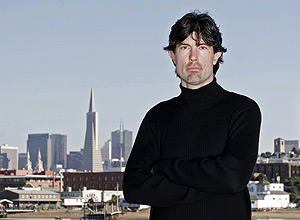Berkeleyan
First endowed faculty chair in new media funded by craigslist
Thanks to matching funds from the Hewlett Foundation's 2007 challenge grant, income from more than $3 million will be available to support the chairholder's work
![]()
| 30 January 2008
Earlier this month, the campus announced plans to establish the first endowed faculty chair at the Berkeley Center for New Media with a donation of $1.6 million from craigslist, one of the most popular websites in the world.
The donation, which will support research, symposia, and lectures, will be matched with $1.5 million from the William and Flora Hewlett Foundation for a total of $3.1 million. The matching funds come from the foundation's landmark challenge grant, announced last September, that it gave to create 100 new endowed chairs at Berkeley. The new chairs are designed to help the nation's leading public research university compete with private institutions.
 Ken Goldberg (Bart Nagel photo) |
Chancellor Birgeneau says the craigslist donation recognizes the Berkeley Center for New Media as a major research center where scholars and students "explore the powerful effect of new media on culture and think rigorously about how new media will continue to change our lives and perceptions."
"The Berkeley Center for New Media and craigslist share a fundamental respect for alternative thinking in the public interest," says its director, engineering professor Ken Goldberg. "Our mission is to critically analyze and help shape developments in new media by facilitating research with unorthodox ideas, designs, artworks, and experiments."
Support from craigslist, one of the most influential leaders in the world of new media, fits perfectly with the center's mission, says Goldberg. "Berkeley faculty and students appreciate craigslist's record of public service and the unique role it plays in urban life and culture for the Bay Area and worldwide," he says. "We share interests in research areas such as privacy, reputation, trust, access, and new ways to encourage socially constructive actions."
Founded in San Francisco in 1995 by Craig Newmark, craigslist began as an e-mail list of events for the San Francisco Bay Area. Jim Buckmaster, who was named the company's CEO in 2000, has led craigslist to become the eighth-largest Internet company in the world in terms of English-language page views and the most-used classifieds service worldwide in any medium.
 Jim Buckmaster, craigslist CEO (Gene X. Hwang/Orange Photography photo)) |
"We're thrilled to support UC Berkeley at a time when unprecedented wealth is being lavished upon private institutions," says Buckmaster. "Berkeley's academic excellence and history of challenging convention mean a lot to us at craigslist, and we rely upon technological innovations from the Berkeley community every day. We're excited to partner with the Berkeley Center for New Media, as it is uniquely positioned to change the very way we think about new media."
Buckmaster will be a founding member of the Berkeley Center for New Media's executive advisory board.
The center supports research and teaching from a diverse community of more than 100 affiliated faculty members, advisers, and scholars. They work in more than 30 departments, including architecture, philosophy, film studies, art history, and performance studies, as well as in the College of Engineering, the schools of information, journalism, and law, and the Berkeley Art Museum.
The $1.5 million in matching funds from the Hewlett Foundation is part of a $113 million Hewlett grant to provide Berkeley with a major new source of endowment funds to attract and support world-class faculty and graduate students and to allow the campus to compete with the nation's best private schools. The Hewlett challenge grant will match other private donations to Berkeley for the Hewlett chairs on a dollar-for-dollar basis, and the ultimate result will be $220 million in new endowment funds for the campus.
The value of endowed chairs to faculty members was captured in a range of enthusiastic statements provided to the Berkeleyan when the Hewlett grant was announced last September. Stephen Shortell, dean of the School of Public Health, observed that they "supplement and extend state resources, enabling faculty and students to do things that would otherwise not be possible. The growth of endowed chairs on campus is critical to maintaining and extending Berkeley's preeminence." And John Lie, who holds an endowed chair in international and area studies, said simply: "The endowed chair has become the golden coin in the realm of academic recruitment and retention....It brings prestige not only to the chairholder but also to the philanthropist and the university."

